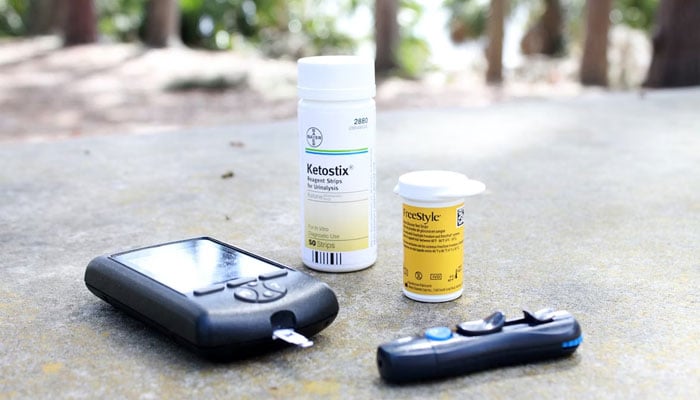If you have these symptoms, you may have diabetes
CDC data shows 1.4 million Americans every year are diagnosed with Type 2 diabetes, making it 95% of diagnosed cases
May 26, 2023

According to the Centers for Disease Control and Prevention (CDC), diabetes is one of the leading causes of death among US citizens.
Experts have maintained that the symptoms may range from mild to severe.
CDC data showed that 1.4 million Americans every year are diagnosed with Type 2 diabetes, making it 95% of diagnosed cases.
Dr Mark Schutta, medical director of the Rodebaugh Diabetes Center at Penn Medicine in Philadelphia, said: "Symptoms are typically slow and insidious and some go undiagnosed for years."
"Those people eventually make their way in the health care system when they have a heart attack or stroke and their life changes forever," he said.
Type 1 and Type 2 diabetes symptoms
According to experts, Type 1 and Type 2 diabetes have many common symptoms which are urinating too often, feeling thirsty or feeling extreme fatigue.
But Type 1 symptoms are more sudden and may occur at a very young age, said Dr Peminda Cabandugama, an endocrinologist at the Cleveland Clinic.
The symptoms can be so prompt that some patients develop diabetic ketoacidosis, a serious complication of diabetes before people even knows they have the disease.
"Those patients end up showing up in the emergency rooms with nausea, vomiting, and in extreme cases, a coma, which can lead to death," Cabandugama said.
On the contrary, Type 2 diabetes is relatively slower. A patient can be diabetic without showing any symptoms for years, but patients are more likely to develop blur vision blurry vision and more skin infections compared to people with Type 1 diabetes, Cabandugama said.
"They're also more likely to have other medical conditions like high cholesterol or blood pressure, and obesity."
What are early symptoms of diabetes?
According to Mayo Clinic, some symptoms apart from the aforementioned may include losing weight without trying, feeling more hungry than usual, and developing blurry vision. Signals showing you high blood sure are:
- Yellow, red, or brown patches
- Darker area of skin that feels like velvet
- Hard, thickening skin
- Blisters
- Skin infections
- Open sores and wounds
- Shin spots
- Small, reddish-yellow bumps
- Red or skin-coloured raised bumps
- Dry or itchy skin
- Yellowish scaly patches around your eyes
- Skin tags
What are prediabetes symptoms?
CDC said that prediabetes is when blood sugar levels are higher than normal but not high enough to be diagnosed with Type 2 diabetes.
Typically, people with prediabetes do not exhibit severe symptoms and sometimes there are no symptoms.
- Being overweight
- Being 45 years or older
- Having a parent or sibling with Type 2 diabetes
- History of gestational diabetes
- Giving birth to a baby who weighed more than 9 pounds
- Having polycystic ovary syndrome
What is gestational diabetes?
Mayo Clinic said that Gestational diabetes is diagnosed for the first time during pregnancy.
"Gestational diabetes typically doesn’t have any symptoms but it usually develops around 24 weeks of pregnancy, with doctors typically testing patients between 24 and 28 weeks," stated CDC.
What are diabetic ketoacidosis symptoms?
The CDC noted that diabetic ketoacidosis (DKA) occurs when the "body doesn’t have enough insulin to get nutrients to the body’s cells. The body begins to break down muscle and fat for energy, which causes a buildup of acids — called ketones — in the blood and urine."
"When too many ketones are produced too fast, they can get to dangerous levels in the body," added CDC.
The initial signs are extreme thirst and frequent urine. But there are other symptoms:
- Fast, deep breathing
- Dry skin and mouth
- Flushed face
- Fruity-smelling breath
- Headache
- Muscle stiffness or aches
- Extreme fatigue
- Nausea and vomiting
- Stomach pain
What are diabetic neuropathy symptoms?
As per the Mayo Clinic description, prolonged high blood sugar can damage nerves throughout the body, leading to a type of nerve damage called diabetic neuropathy,
Typically, this affects the nerves in the legs and feet but can also cause problems with the digestive system, urinary tract, blood vessels, and heart. You should call a doctor if you suffer:
- A cut or sore on your foot that is infected or won’t heal
- Burning, tingling, weakness or pain in the hands or feet
- Changes in digestion or urinating
- Dizziness and fainting









